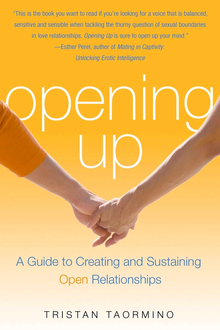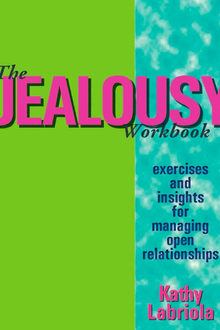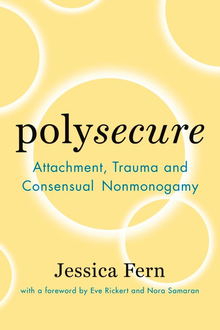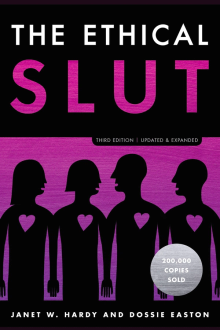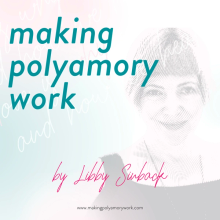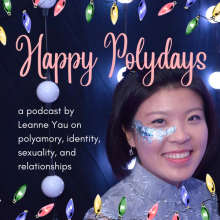Poly 101
Polyamory can be confusing when you first hear about it. This guide will give you a brief overview of everything you'll need to know to get started.
Consider this the foundation on which your knowledge house will sit.
Terminology
Let's start with some terminology. We need to be speaking the same language and operating with the same mental models.
is defined two ways:
- A romantic relationship structure with more than two people, with the knowledge and consent of everyone involved. "We are in a polyamorous relationship"
- An individual part if a person's identity, similar to gender or orientation. "I am polyamorous"
, ethical non-monogamy, and consensual non-mongamy are all phrases that encompass the wider world of relationships involving more than two people. Polyamory is one type of relationship that is characterized by romantic feelings. Other forms of multigamy you may be familiar with are swinging and sexual friendships (friends with benefits).
Personal boundaries are the limits and rules we set for ourselves in order to feel comfortable and safe. These boundaries can be physical, emotional, or mental. It's important to communicate personal boundaries in any relationship so that everyone involved understands what is and isn't acceptable behavior. Any agreement between two or more people qualifies as a rule or agreement.
Consent is an agreement between two or more people to engage in a particular activity. It is essential for any healthy relationship, and it must be freely given without coercion or manipulation. Consent is a key tool that helps to communicate and enforce personal boundaries.
This is a good starting point that establishes some key phrases used in the rest of this guide. Head on over to Concepts if you want to dive deeper into the language of poly.
Misconceptions
Here's a common conversation that happens when poly people bring up the topic.
Cheating
"Polyamory, what's that?"
"It's when you have a romantic relationship with more than one person."
"Oh so it's cheating?"
"No. Everyone knows and agrees to this."
"Oh so you're gaslighting two people?"
"No. My partners and I have talked about our needs, desires, and boundaries many times. We have designed our relationships to fit who we are."
"Oh, so it's cheating with extra steps"
*internal scream*
Cheating happens when a rule or agreement between people is violated. The most common form of cheating is having sex with someone outside of a relationship.
Yes, cheating is common in monogamous relationships.
Yes, cheating can happen in multigamous relationships. We make our own rules and agreements, but those can still be violated.
Yes, cheating is something we should all try to avoid. If you have cheated, it might indicate that rules and agreements of your current relationship don't match your needs and desires.
Gaslighting is a form of psychological manipulation that involves making someone question their own thoughts, feelings, and experiences. It is a tactic used to gain power and control over someone by making them doubt themselves. Conversations about love and relationships can be difficult. It's important to establish a safe space to communicate when talking about these subjects. Everyone's voice should be heard. Clarify what others are saying. Ask open ended questions without a specific answer in mind.
Three sets of feet under the sheets
Outside of the poly community, you'll often see news articles and blog posts that broach the subject of polyamory with this photo.
It's an image that is often used to sensationalize polyamory, but it doesn't accurately represent the reality of being poly. While there can be physical intimacy between three or more people, it isn't always the case. Polyamorous relationships can be configured in many ways, like constellations in a starry sky.
Polyamory is not all about the sex. Most people in poly relationships want many aspects of a relationship including the romantic and emotional connection. Some poly relationships may not even include sex at all. Demi, grey, and asexual people can engage in happy and loving poly relationships by building a relationship that suits their needs and desires.
"You're afraid of commitment"
Broken record here. Poly people build relationships based on their wants and needs. This usually requires building consent, community, and common agreement. It takes time and effort to engage in a polyamorous relations. Commitment comes with the territory, but don't confuse commitment with entanglement.
Entanglement is the blurring of boundaries and separation between two people. Think of it like sharing a home, bank account, or raising children together. Poly people will need to communicate their level of desired entanglement.
Yes, it's possible to be committed but not entangled.
No, it doesn't mean you love or care for a less entangled relationship more than an entangled one.
Community Guidelines
Poly communities will have their own rules and guidelines, but here are a few common ones.
- Consent is primary - Nobody should ever engage in any relationship or activity without enthusiastic and free willed consent. Respect boundaries when they are enforced.
- Communication is key - You will hear this a lot. Every advice thread in a forum, discord, or reddit post will say the same thing. "Talk to your partner." You can also hire a pro. Therapists and relationship coaches can help you build the tools of talking, listening, and creating a safe space for communication.
- Seek clarification, don't assume - You will encounter a wide array of people and relationship structures. Don't assume you know who someone is or how the relate to someone else. Ask for a person's pronouns. Introduce yourself with your pronouns. "I'm David, he/him, nice to meetcha." Introduce friends and partners with a quick overview. "This is Maria, she's my nesting partner."
- Learn the - This is a tool created by that can help guide the type response you'd like when discussing a topic.
- Triforce 1 - "I just want to be heard"
- Triforce 2 - "I want sympathy or encouragement, but no advice"
- Triforce 3 - "Seeking advice"
- Don't "out" people - In many ways, polyamory is in its early days. Poly people are frequent targets of discrimination. If you are in mixed company and you don't know the level of disclosure your friend or partner has established, default to everyone being a "friend." There is a time and place for disclosure, and a surprise whoopsie at Gam-Gam's funeral is probably neither.
Go To Poly College
Relationships are hard.
It takes a lot of knowledge, skill, and practice to communicate your needs and wants with someone and negotiate rules and agreements. Poly relationships add a layer of complexity to whole deal. You'll need to manage multiple relationships, their time commitments, and how each partner may relate to each other. Thankfully, there are many resources out there to help you out.
Consider reading some books:
Or checkout some podcasts:
Follow some thought leaders:
Or pave your own path. However you choose to do it, fill your toolbox with what you'll need to build the relationship that fits you.
